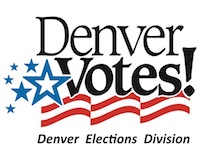This year, Colorado will have a presidential primary, partisan caucuses and then another primary for all state level and local partisan races. Confused? You’re not alone.

In North Denver, both Democratic and Republican officials are working to turn out party members for caucus and educate both party members and unaffiliated voters about how they can engage in the primary.
First up will be the presidential primary. Democrats will receive a Democratic ballot, Republicans a Republican ballot, and unaffiliated voters will receive both but can only return one. While unaffiliated voters could vote in the last local primary election, this is the first time unaffiliated voters can vote in the presidential primary in Colorado.
Ballots are expected to arrive in mailboxes mid-February and are due by March 3.
Why have both caucuses and primaries?
In previous election cycles, Coloradans weighed in on the presidential candidates through neighborhood partisan caucuses. Now, the primary determines how many delegates a candidate receives at their party’s national convention. With the change to a presidential primary, one might wonder why caucuses still exist.
“You go to caucus because you want civic engagement,” said Kristina Cook, chairwoman of the Denver County Republican Party. She explained caucus (and subsequent assemblies) are the opportunity to become a precinct committee person, run for delegate to attend the national convention, and otherwise become more involved.
Interested in attending caucus? Learn more here or scroll to bottom.
On the Democratic side, the sentiment is much the same. “People get to come and meet like-minded neighbors who care about similar issues. You can learn about candidates, ballot measures and policy issues,” said Danielle Glover, Highland resident and Democratic House District 5A captain.
For Democrats, the caucus and assembly process is also how several U.S. Senate candidates are planning on getting onto the primary ballot. Candidates can either garner the support of 30% of delegates at the state assembly or collect signatures from across the state.
“I’m excited to see how many Democratic candidates are stepping up to challenge (U.S. Senator) Cory Gardner,” said Adam Platt, Democratic House District 4A captain. “I look forward to a robust debate as to who is best suited to replace Cory and better represent the people of Colorado.”
The Denver North Star recently joined with Regis University to host a Senate candidate forum. You can find the video at DenverNorthStar.com and on social media at @DenverNorthStar.
For Republicans, it’s also a chance to nominate challengers against Democratic state representatives in both North Denver districts. Republican Jonathan Woodley, who unsuccessfully ran for City Council District 9 last year, has already announced his candidacy for House District 5. They will also rally support in defense of U.S. Sen. Gardner, who is running for a second term.
Working to educate voters about the changes
Both Cook and Glover agree that the new system may be confusing and said their parties are working to educate voters about how they can participate: calling, texting, emailing and otherwise reaching out to make sure they understand the changes.
While the primary is open to unaffiliated voters, caucuses are still only open to members of that party. For the first time, caucuses will also be held on a Saturday instead of a weekday evening, something both parties hope drives more attendance.
Alton Dillard, a spokesperson for the Denver Elections Division, said his office is doing everything it can to educate voters ahead of the arrival of ballots as well and wants to remind voters about the new laws:
“If [unaffiliated voters] fill out both a Democrat and Republican ballot, their vote won’t count,” Dillard said. “Unaffiliateds will get both, but can only return one.”
Green Party members, libertarians, and other minor party members won’t receive a presidential primary ballot since they cannot vote in the major party elections and don’t have primaries this year. Dillard said he has been reaching out to press, increasing the clerk’s office social media presence, and otherwise working to inform the public.
Another new law allows 17-year-olds who will be 18 by the general election day to vote in the primary. Dillard said nearly 1,800 17-year-olds who are pre-registered to vote will receive a ballot in the mail. All 16- and 17-year-olds are able to pre-register to vote and 17-year-olds who will be 18 by election day who sign up now are also eligible to vote in the primary.
Interested in attending caucus?
Both major parties caucus on Saturday, March 7.
Unlike elections where voters can use any voting center, caucus attendees must attend the correct location for their precinct. Democrats and Republicans have different locations. In order to find your precinct, please contact the parties. Only registered party members are able to caucus.
Democrats:
Visit denverdemocrats.org or call 303-830-8242
Republicans:
Visit denvergop.org or call 720-787-7691

Be the first to comment